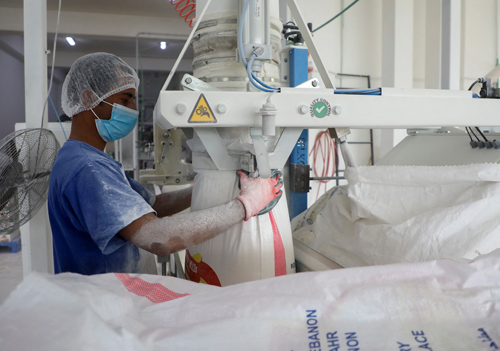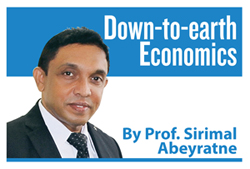Rules of the game of debt
View(s):
A man works on a machine filling wheat flour into sacks at a mill in Beirut, Lebanon, March 1, 2022. Picture taken March 1, 2022. REUTERS/Mohamed Azakir
Finally, Lebanon, which was once called “Switzerland in the Middle East”, needed someone to bail it out. Along with a foreign exchange crisis, domestic supply shortages and hyper-inflation, it failed to meet its maturing foreign debt obligations; the government had to declare its inability to repay the maturing foreign debt since 2020.
And, it was none other than the IMF that is bailing out the collapsing Lebanese economy after trying all other possible ways. A report published by the Reuters last week, revealed that the IMF has asked Lebanon to meet “tough pre-conditions” before negotiating a bailout package. The conditions include steps that the Lebanese government has long failed to deliver, raising doubts over whether a rescue plan would be politically acceptable to the ruling politicians in Lebanon.
The deeper the crisis, the harder the way out and, tougher the conditions are! Let’s have a look at what happened in Lebanon and how serious is the way out for it.
Maturing foreign bonds
Lebanon is a small country in West Asia with little over 10,000 square km in size and nearly seven million people. The country is surrounded by Syria from the north and the east, Israel from the south and, the Mediterranean Sea from the west. During the first 5-year period of the post-war economy (2006-2010), Lebanon reported a massive increase in its per capita GDP from less than US$7,000 to over 9,000, reaching the threshold of a “high-income” country.
On the contrary, however, Lebanon’s imports were 4 – 5 times greater than its exports, resulting in a massive trade deficit. And it was also a country with a persistent budget deficit amounting to about 6 – 8 per cent of GDP. It’s quite weird that remittances of Lebanese migrant workers were more than twice the export earnings of the country! Before COVID-19, there were also about half a million tourists a year arriving in Lebanon. Although Lebanon had tiny foreign direct investment (FDI) inflows, its foreign borrowings were massive!
It had been borrowing and borrowing and, building infrastructure until the debt to GDP rose to 150 per cent. After all, what is important is not the size of the debt-GDP ratio of any country, but the country’s ability to honour the maturing debt with adequate cash flows.
In the absence of adequate export growth, Lebanon’s foreign exchange earnings depended much on tourism and worker remittances, which cushioned the massive trade deficit. If people are leaving the home country in large numbers seeking jobs in foreign countries, it’s a sign of misery for a small country like Lebanon. It shows that the country’s economy has no capacity to absorb its own workforce into productive work on the one hand and to reward them adequately on the other hand; Lebanon was a clear-cut portrait of this tragedy.
Defaulting foreign debt
While the government budget was in deep disarray, the politicians introduced a public sector salary hike in 2018, aiming at elections. But there were no reforms to generate exports or sustain productive investment. The foreign exchange crisis resulted in massive supply shortages in the domestic market, including electricity supply; since the outbreak of the pandemic, inflation has skyrocketed to above 100 per cent.
 On top of all economic and financial woes, corruption at top levels was rampant. There was a massive explosion in the Port of Beirut in August 2020 killing more than 250 and injuring thousands. It was strange enough that the explosion triggered massive protests in Beirut, claiming that it was much more than an unavoidable accident or a horror of negligence!
On top of all economic and financial woes, corruption at top levels was rampant. There was a massive explosion in the Port of Beirut in August 2020 killing more than 250 and injuring thousands. It was strange enough that the explosion triggered massive protests in Beirut, claiming that it was much more than an unavoidable accident or a horror of negligence!
And the Lebanese government declared on March 7, 2020 that it was not in a position to pay the maturing foreign debt; the first default was $1.2 billion bond maturing Monday! The declaration of default aggravated the crisis; the exchange rate collapsed, inflation rose, ATMs didn’t issue money and, the banks could not pay the depositors. After a resulting economic contraction, public debt stood nearly 500 per cent of GDP by the end of 2021.
“Switzerland in the Middle East”
Lebanon – before the 1970s -, was known as the ‘Switzerland of the Middle East’: Beautiful snowy mountain caps with great skiing sites, large stock of gold reserves, best banking system in West Asia, plenty of shops selling delicious chocolates, vineyards and wines and, of course, the pluralistic Lebanese society – the melting pot of all these beautiful things justified that nickname. In 2009, the New York Times ranked the capital city of Lebanon, Beirut, as the No. 1 travel destination in the world due to its nightlife attraction and competitive hospitality industry.
As decision-making in Switzerland at different levels of the state is shared by everyone, politics in this Scandinavian country is not divided between the ruling party and the opposition parties; and the result was peace and prosperity! In contrast, the West Asian country, Lebanon too had managed its “unity in diversity” beautifully until the things changed for Lebanon in the early 1970s.
In Lebanon, ‘divide and rule’ among various communities gradually weakened the state structures leading to conflicts. The country had two stages of political unrest for 30 years: Its own 15-year civil war ended in 1990; but the country was prone to conflicts and the presence of Syrian military forces until 2005.
Although the peaceful post-war Lebanon was an attractive tourist destination in the world, it was primarily the politics that changed the destiny of Lebanon.
Post-war economy
In the post-war economy after 30 years of war and unrest, anything that made Lebanon look like Switzerland faded away. Instead of building the post-war economy, the country’s reversal leading to today’s crisis started! Crises built up slowly, and then the collapse occurred quickly.
By the time the pandemic hit the Lebanese economy, it had fulfilled the pre-conditions for the collapse, which was only triggered by the pandemic. Today, it is not the ruling elite who suffer from the crisis, but the average people of Lebanon. In fact, in crisis situations, politicians know it well how to get away from the problem and, sometimes how to benefit from even the crises.
The Fall 2021 issue of the World Bank’s Lebanon Economic Monitor (LEM) titled “The Deliberate Depression” blamed the political elite of post-war Lebanon who ruled the country for a long time for bringing about such an unprecedented crisis onto the general population. This means that Lebanon’s deliberate depression has been orchestrated by the country’s ruling politicians.
End of the tunnel
At the end of the tunnel, it is only the IMF out there to rescue the Lebanese economy from a crisis. But the road to recovery through IMF pre-conditions is tough. It includes a framework for fiscal reform, programme for revamping the insolvent banking sector, audits of the central bank and, reforming the loss-making state-owned power company.
It’s not that the IMF is going to impose any conditions; the IMF wants the government to come with an action plan to the negotiating table.This means that the Lebanese government cannot go empty-handed to the IMF for negotiating any bail-out package.
According to Reuters, “…Lebanon’s economic recovery programme must include fiscal reforms that ensure debt sustainability, financial sector restructuring, electricity sector reform, anti-corruption work and a credible monetary and exchange rate system.” Financial sector restructuring includes imposing capital controls and amending “banking secrecy” as well. The problem is that, as analysts say, how could politicians agree on reforms that could threaten their own vested interests? On the contrary, the crisis itself may be a better choice from a political point of view than trying to solve it with a hard knock.
(The writer is a Professor of Economics at the University of Colombo and can be reached at sirimal@econ.cmb.ac.lk and
follow on Twitter @SirimalAshoka).
Hitad.lk has you covered with quality used or brand new cars for sale that are budget friendly yet reliable! Now is the time to sell your old ride for something more attractive to today's modern automotive market demands. Browse through our selection of affordable options now on Hitad.lk before deciding on what will work best for you!


